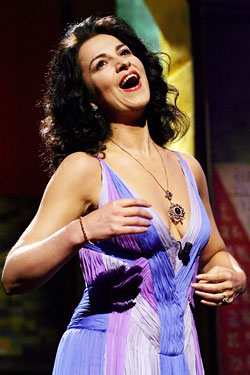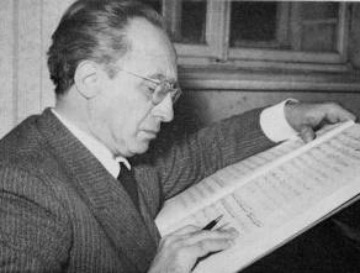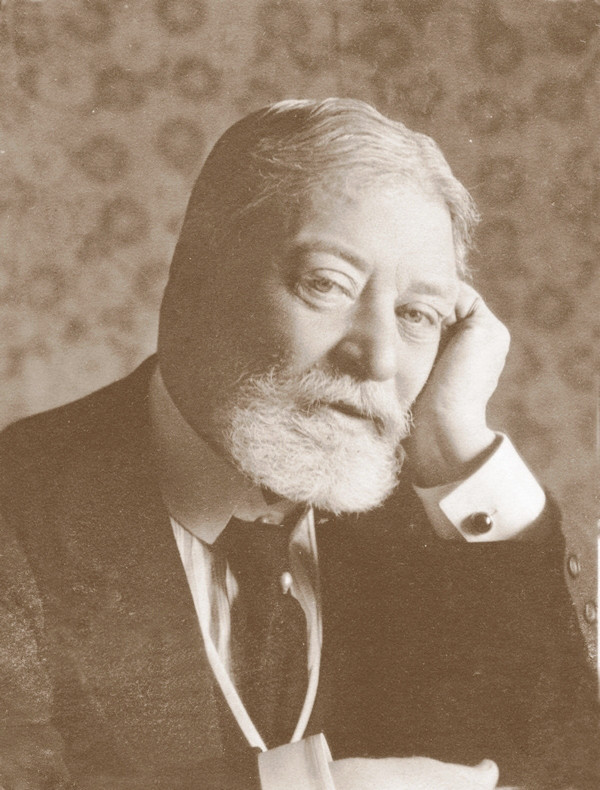|
SATURDEE OPRY LINKS 51:
Valentine's Day Heartbreak Edition
  
Angela Gheorghiu
Lincinio Refice
Paolo Tosti
Saturdee Opry Links Overture!
"Orpheus in the Underworld," by Offenbach.
https://www.youtube.com/watch?v=vEnW5_GTooI
1.
Lincinio Refice (1885-1954) was a priest who taught at the Scuola Pontifica for
sacred music in Rome for some 40 years. He died on the rostrum while conducting
the morning rehearsal of his own opera, "Cecilia" (with soprano Renata Tebaldi),
inspired by the life of music's patron saint. The words of 'Ombra di Nube' are a
prayer, a plea and a reminder of the eternal beauty that remains when the pain
goes. Here is the great soprano of the past, Claudia Muzio.
https://www.youtube.com/watch?time_continue=195&v=LVcIBzMgTaQ
Text and Translation:
Era in ciel un arco azzurro di fulgor;
chiara luce si versava sul mio cuor.
Ombra di nube, non mi offuscare;
della vita non velarmi la beltà.
Vola, o nube, vola da me lontan;
sia disperso questo mio tormento arcan.
Ancora luce, ancora azzurro!
Il sereno io vegga per l’eternità!
The sky was an arc of dazzling blue;
A brilliant light shone down on my heart.
Shadow of a cloud, do not bring me darkness;
do not obscure the beauty of life for me.
Fly, cloud, fly far away from me;
Let this strange torment of mine be swept away.
Bring back the light, bring back the blue!
Let me see the clear sky for all eternity!
About Refice:
https://en.wikipedia.org/wiki/Licinio_Refice
2.
Sometimes you spend your life writing music, but wind up being known for one or
two songs and nothing more. Such is the case with Stefano Donaudy. Soprano
Angela Gheorghiu with Donaudy's little free-standing song of lost love, almost
his entire legacy, "O del mio amato ben," or "Oh, lost enchantment of my
beloved."
https://www.youtube.com/watch?v=7uB8Icx-UPc
Translation:
http://www.lieder.net/lieder/get_text.html?TextId=4906
About the composer:
https://en.wikipedia.org/wiki/Stefano_Donaudy
3.
Angelo Mascheroni is yet another composer who, despite his labors, wound up
being known for just a song. And the song, appropriately entitled "Eternamente,"
never made him much money. The poor fellow had trouble getting even a couple of
guineas for the copyright in London, but of course, when the copyright was sold
by public auction a few years later, it brought thousands of guineas (the record
price paid for a musical copyright at the time.) I suspect this is because the
song had, by that time, been recorded by Enrico Caruso. Here is that recording.
https://www.youtube.com/watch?v=SyAqPAc8GF0
Translation:
http://levysheetmusic.mse.jhu.edu/collection/140/134
What is this secret spell around me stealing?
The evening air is faint with magic power
And shadows fall upon my soul, revealing
The meaning of this memory-laden hour!
A year ago our paths in life were parted
A year ago we severed, broken-hearted!
Where art thou now?
On earth, my love?
Or did they spirit soar to realms above?
Though nevermore, on earth
Those eyes serene and holy
Thy face that shone in beauty
Nevermore, nevermore I may see!
The music of thy voice
Is echoing still within me!
Thou reignest in my heart, mine own
In life and death I love thee!
About Mascheroni:
https://en.wikipedia.org/wiki/Angelo_Mascheroni
And here is soprano Angela Gheorghiu with an interpretation of the same song,
from her new album, "Eternamente: The Verismo Album."
https://www.youtube.com/watch?v=Z-gas91b2lU
4.
Angela Gheorghiu's new album, a collection of verismo singing, features a number
of lesser known opera excerpts, as well as favorite chestnuts such as "Eternamente"
(the album title.) But it also includes "Vissi d'arte," from "Tosca," by
Puccini. Writes Opera News: "Tosca fits her like a glove. This may be the best
thing on the album, because she sings it straightforwardly, without mannerism or
fuss, spinning out long, arching phrases; the character's pain and fear come
through vividly." Listen for the moments when the voice is so pure in tone that
it is almost not recognizable as a human voice. (How do they do that?) The aria,
of course, could not be more topical today, as it is sung after the fiendish
Scarpia extorts a promise of sex from Tosca, in exchange for sparing the life of
her beloved, Cavaradossi.
https://www.youtube.com/watch?v=NzbbFEfosn0
Translation:
http://www.aria-database.com/search.php?individualAria=302
A little preview of Angela Gheorghiu’s new album, “Eternamente: The Verismo
Album.”
https://www.youtube.com/watch?v=7oeEoppznws
5.
Please forgive dwelling on a very familiar aria two links in a row. But it is
interesting (at least to me) to compare this performance of "Vissi d'arte" by
Sonya Yoncheva with that of Angela Gheorghiu in the previous link. Both are
superb. Yet one feels more natural, spontaneous, genuine, as if it is being
invented in the moment, born of brand new thoughts. Can you guess which?
https://www.youtube.com/watch?v=bLc6nfvgN8A
6.
Seeing as SOL finds itself dealing with somewhat somber, rather heart-rending
(not "heart-wrenching!") pieces so far, here is another such item, "Repentir," a
song by Gounod, from late in his life. A very beautiful final prayer by the
great operatic composer. Again, with Sonya Yoncheva. Don't you really get the
sense that this woman means what she sings?
https://www.youtube.com/watch?v=lLoLCSKFQm0
Translation:
https://www.charles-gounod.com/vi/oeuvres/melodies/txtchant/repenti.htm
7.
Continuing our breaking heart edition of SOL, here is the Neopolitan
song, "Pecche" ("Why?") as sung long ago by Caruso (wonderful orchestra added
much later.) Why, indeed. . .For some reason, this song is a favorite in Russia,
by the way. Written in 1913 by Gaetano Enrico Pennino to lyrics by Carlo De
Flavis.
https://www.youtube.com/watch?v=D-eNzVmS-X8
"The night passes, the day passes and evening,
But this my suffering doesn't want to pass.
The moon also passes and it's sincere
If it prompts me to forget you forever!"
Translation:
http://www.napule-de-canzone.com/pecche_eng.html
8.
"Se Come Voi Puccini, I mean Piccina." An aria from Piccina, I mean Puccini's
first
opera, "Le Villi" ("The Fairies"), this is one one of my favorites (and
apparently it was favored by Dvorak, who appropriated aspects of it, in my
opinion, for "Song to the Moon" in his opera, "Rusalka.") "If I were tiny, like
you, a flower. . ."
Anna, daughter of Guglielmo, engaged to Roberto, is in town in the Black Forest
during spring. She puts her bouquet from her engagement celebration in Roberto's
luggage. He is about to leave to go to Mainz where he has been left a fortune.
She hopes that he will think of her when he looks at the flowers.
https://www.youtube.com/watch?v=lUoIX4uop30
I confess to being quite smitten with Yoncheva's singing.
Translation:
http://www.allthelyrics.com/forum/showthread.php?t=52442
9.
In a garden in Argante's palace, Jerusalem, Palestine, during the Crusades,
Almirena---abducted by the sorceress Armida and imprisoned in the
palace---laments her fate. Wouldn't you? Here is the glorious, tender Handel
aria, "Let Me Weep," from the opera, "Rinaldo." If, while listening, you
suddenly feel compelled to buy an SUV, blame demographers everywhere. "Lascia
ch'io pianga," sung by the nearly incomparable Joyce Di Donato.
https://www.youtube.com/watch?v=oJJnhp2CYnk
Translation:
Let me weep over
my cruel fate,
and let me sigh for
liberty.
May sorrow shatter
these chains,
for my torments
just out of pity.
https://en.wikipedia.org/wiki/Lascia_ch%27io_pianga
10.
The plea for the return of a perfect lost love, "Ideale," by Paolo Tosti, is
usually sung by a tenor. Here is a specimen not only rare for it being a
soprano, but altogether rare. This delicate, affecting rendering is intoned by the
all-but-forgotten Regina Pacini in 1906. From the blurb accompanying the video:
"Regina Pacini de Alvear was born in Lisbon, Portugal in 1871, and died in 1965,
at 94 years of age, in Buenos Aires, Argentina. With the exception of some
performances at Covent Garden, her life and career took place almost entirely
within the Latin world, where she was celebrated both as a gifted lyric bel
canto soprano, and also as First Lady of Argentina for many years, as wife of
Don Marcelo Torcuato de Alvear, president of Argentina from 1922 to 1928. She
was additionally known in later life as a great benefactor of the arts. Her name
is not well known in the United States today, as she never, to the best of my
knowledge, sang here. Her recordings are very few and of rather poor quality, as
she did not record beyond 1907, when she retired from public performance."
But SOL remembers her!
https://www.youtube.com/watch?v=gOOGlKnc9W4
Translation:
http://www.lieder.net/lieder/get_text.html?TextId=5466
FINAL BOW:
"You can't look at me any more." In the case of your SOL host, this is entirely
understandable, but in the classic case of lost love, it is forever
heartbreaking. Here is the great Joseph Schmidt, the "Pocket Caruso," with the
Tosti song, "Penso" ("I think.")
https://www.youtube.com/watch?v=EDoTDQF2O8s
Translation:
http://www.lieder.net/lieder/get_text.html?TextId=112598
Back to Opera Links
Back to Home Page
|



